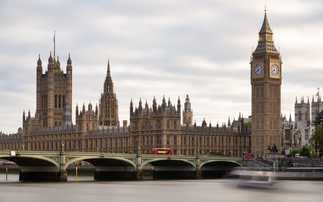
Rachel Reeves Credit: HM Treasury Flickr
The chancellor is planning to use the 26 November Budget to limit the amount of someone’s salary that can be sacrificed through pension contributions without incurring National Insurance (NI) payments to £2,000 a year.
Reports in The Times and Financial Times this weekend said the chancellor would target pension salary sacrifice arrangements to raise up to £2bn a year and help fill a £30bn gap in public finances.
At present, there is no limit on the amount that an employee can put into their pension under salary sacrifice schemes before it becomes subject to NI.
Should a cap be introduced any pension contributions over the £2,000 level would result in an employee paying the full rate of NI of 8% on a salary of less than £50,000 and 2% on income above that.
The reports say Reeves has decided not to cut pension lump-sum withdrawals due to concerns about the impact on pensioners – meaning people who retire will be able to continue making tax-free drawdown payments worth 25% of a total pension pot up to a maximum of £268,275.
The reports come just months after HM Revenue & Customs (HMRC) published research looking at the experiences, motivations, and attitudes of employers towards using salary sacrifice arrangements for pensions.
As part of the research, HMRC explored whether "hypothetical changes to tax reliefs, such as reform of NI relief" on pension salary sacrifice arrangements could impact employers' motivations and attitudes towards these arrangements.
One of the scenarios modelled by HMRC looked at the impact of removing the NI exemption for salary sacrifice pensions beyond a threshold of £2,000 per year – a move it said would mean that employers and employees would not need to pay NI on any salary sacrificed up to £2,000 but would need to pay NI on any salary sacrificed above this amount.
It said that, for an employee earning £45,000, reducing their salary by 5% would result in £2,250 of salary sacrificed per year.
Under a cap, HMRC said the £250 above the £2,000 threshold would be liable to employee and employer NI – meaning the employee would pay an additional £30 in NI and the employer would pay an additional £34 in NI.
HMRC said employers "generally responded to this scenario most positively" of the three it tested – with some noting that, due to the level of their staff wages, it would have minimal impact on their business.
But it added that "most employers" were still concerned that this scenario resulted in a reduction of benefits and that, regardless of earnings, it could "disincentivise saving for a pension".
It said a common response from employers was that, despite this scenario not impacting many employees due to the wage threshold, there was a concern that changing the rules around salary sacrifice for pensions may inevitably cause confusion and risk people becoming more disengaged with pensions.
A sizeable cost to employers
Last week, the Society of Pension Professionals (SPP) said it had written to all 650 members of parliament to warn against the risks of reducing or removing salary sacrifice arrangements for pension contributions.
The SPP's paper noted that around a third of private sector employees currently use salary sacrifice arrangements, as well as almost 10% of public sector workers.
The society argued this makes salary sacrifice a "well established" and "well-functioning" feature of the UK pensions landscape.
The SPP calculated the cost to the government in providing salary sacrifice arrangements was £4.1bn, which amounted to £1.2bn for employees and £2.9bn for employers. However, the SPP stated there is "widespread recognition" this is a positive investment which incentivises pension saving.
The SPP's paper also said scrapping salary sacrifice would represent a "sizeable" cost to employers and would also breach the chancellor's commitment to not impose any additional costs on employers.
Standard Life retirement savings director Mike Ambery said: "This is being billed as a Budget of tough choices, so it isn't surprising the government is looking at salary sacrifice arrangements, which are typically offered by larger private sector employers. Unlike changes to pensions tax-free cash which has some popular understanding, the inner workings of salary sacrifice are poorly understood.
"The changes mooted over the weekend would largely affect middle and higher earners in the private sector who are currently able to reduce their take-home pay in exchange for pension contributions that are not subject to income tax or national insurance. By limiting the amount of income that can be sacrificed without paying National Insurance, the government will be increasing the cost of pension contributions to both the individual and the company if the level of contributions is maintained. Ultimately, the impact of National Insurance being paid will be felt in employees' pockets with less take home pay and in employers' payrolls with higher costs.
"Of all the changes being floated in relation to pensions this is one of the least impactful but undoubtedly it still comes at a cost to savers.
"The government is navigating a difficult path while looking to shore up the nation's finances and at the same time running a Pension Commission designed to increase levels of savings. We hope that a rounded view will be taken at the Budget and that the long-term challenge of ensuring people reach later life with sufficient savings will be kept front of mind in the government's thinking."
This article originally appeared on PA's sister title Professional Pensions















